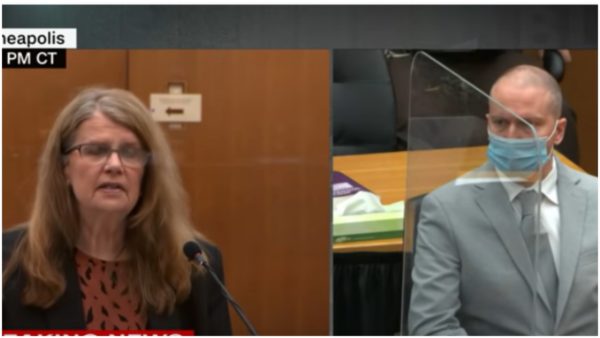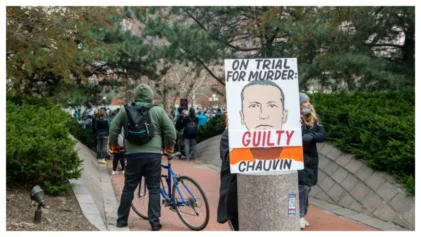Former Minneapolis police officer Derek Chauvin, who became the poster child for police misconduct in May 2020 following the murder of George Floyd, was sentenced to prison on Friday after being denied his request for a new trial. Chauvin killed the unarmed Black man as a result of kneeling on his neck for approximately nine minutes and 29 seconds.

Hennepin County Judge Peter Cahill served Chauvin a sentence of 270 months or 22.5 years for charges of second-degree unintentional murder, third-degree murder, and second-degree manslaughter in Floyd’s death. The 45-year-old disgraced officer received a credit of 199 days served in prison. The news comes two months following his conviction. In Minnesota, the most severe charge, second-degree unintentional murder, has a maximum of a 40-year sentence.
Meanwhile, the charges of third-degree murder and second-degree manslaughter can result in imprisonment of up to 25 and 10 years. Chauvin’s attorney, Eric Nelson, requested that his client get probation and time served. Prosecutors wanted 30 years, while Floyd’s family sought the maximum time allotted by law. According to The Associated Press, with good behavior, Chauvin could be paroled after serving two-thirds of his sentence, equivalent to about 15 years.
Regarding the sentencing, Judge Cahill expressed that his decision was neither rooted in emotion nor sympathy. He continued, “But at the same time, I want to acknowledge the deep and tremendous pain that all the families are feeling, especially the Floyd family. I’m not going to attempt to be profound or clever because it’s not the appropriate time. I’m not basing my sentence on public opinion. I’m not basing it on any attempt to send any messages.” He also attached a 22-page letter further explaining his decision.
Chauvin showed little emotion before and after his sentence handed down to him. In court, he removed his mask and spoke to Floyd’s family for only a few moments, citing “some additional legal matters at hand.” He added, “But very briefly, though, I do want to give my condolences to the Floyd family. There’s going to be some other information in the future that would be of interest. And I hope things will give you some peace of mind.”
His mother, on the other hand, showed much more emotion as the public got a chance to hear from her for the first time since that faithful day in May 2020.
Carolyn Pawlenty did not specifically address Floyd’s death or his family, instead pleaded for her leniency through tears for her son.
“When you sentence my son, you will also be sentencing me,” she told the judge, noting that she’ll no longer be able to give him “special hug” and that his father will likely pass before his release.
Pawlenty defended her son against assertions that he’s a racist. “I want this court to know that none of these things are true and that my son is a good man,” she said. Pawlenty assured her son that she’s always believed in his innocence and will never waiver.
While Pawlenty’s plea for her son isn’t entirely unexpected, it was not well received by many on social media. In a post of Pawlenty’s statements on The Shade Room, followers unleashed on Pawlenty.
One user commented, “I found what she said to be insulting and selfish. How she wont be able to hug her son if he gets a long sentence… What about George and his family?? His little girl who won’t be able to hug her dad at all ever?”
Another added, “She was better off staying hidden because she got up there and made a complete fool of herself.”
“This infuriated me on so many levels. No apology or even acknowledgement of george Floyd!,” exclaimed another.
Civil rights leader Rev. Al Sharpton released a statement following the decision stating, “Let us not feel that we’re here to celebrate.” He added, “Justice would have been George Floyd never having been killed. Justice would have been the maximum. We got more than we thought only because we have been disappointed so many times before.”
Floyd was arrested on May 25, 2020, following claims that he attempted to use a counterfeit $20 bill at a local convenience store. The last moments of his life were captured on cellphone footage by then 17-year-old Darnella Frazier. Floyd’s death sparked outrage and protests in all 50 states and over a dozen countries.
Chauvin—who is expected to—has 60 days to appeal his sentence with the Minnesota Court of Appeals and the denial of a new trial.


